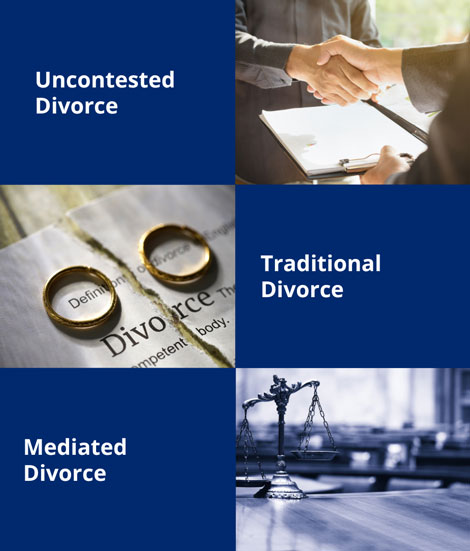Understanding The Divorce Process In The Woodlands: A Comprehensive Guide
At Griffin & Cain, Attorneys at Law, PC, we help individuals and families across Montgomery County, Harris County, Walker County, and Grimes County navigate divorce with confidence. Whether your separation is amicable or highly contested, our attorneys have the knowledge, experience, and compassion to guide you toward the best possible outcome.


Categories Of Divorce In Texas
While every divorce is unique, most cases in Texas fall into one of three categories:
- Uncontested divorce
- Mediated divorce
- Traditional (contested) divorce
Each type involves different legal procedures, timelines, and levels of conflict. Understanding these categories is the first step toward choosing the best path forward for your situation.
Uncontested Divorce In Texas
An uncontested divorce is the most straightforward and cost-effective option. This occurs when both spouses agree on every issue involved in the divorce, including:
- Division of property and debts
- Child custody and visitation
- Child support and health insurance
- Spousal maintenance (if applicable)
Key Characteristics:
- No courtroom battle: The agreement is drafted, signed, and submitted to the court.
- Faster timeline: Once filed, a divorce in Texas can be finalized in as little as 60 days—the mandatory waiting period.
- Lower cost: With no disputes to litigate, legal fees are significantly reduced.
- Predictable outcome: Both parties maintain control over the final agreement.
At Griffin & Cain, Attorney at Law, PC, we offer flat-fee options for many uncontested divorces. We will draft all required documents, file them with the court, and guide you through every step to ensure your divorce is finalized properly and efficiently.

Who Should Consider An Uncontested Divorce?
- Spouses with no minor children or a parenting plan already in place
- Those with modest or easily divisible assets
- Couples who are committed to a peaceful resolution
- Partners who want to save time, money, and stress
Mediated Divorce: A Cooperative Approach
If you and your spouse are not in full agreement, but want to avoid going to trial, a mediated divorce may be the best option. Mediation is a structured process where both parties work with a neutral third-party mediator to reach an agreement on contested issues.
Mediation is increasingly popular in Texas because it helps families avoid lengthy litigation while still addressing disagreements in a constructive way.
Benefits of mediation:
- Confidential: Unlike court hearings, mediation is private.
- Less adversarial: Promotes cooperation and preserves long-term relationships—important for co-parents.
- Flexible: You and your spouse retain control over the outcome.
- Cost-effective: Often far less expensive than trial litigation.
Our divorce attorneys are highly experienced in mediation. We help you prepare, clarify your goals, and negotiate effectively to achieve a fair and lasting settlement.
When Is Mediation A Good Choice?
- You and your spouse disagree on custody, property, or support—but are willing to work together.
- You want to avoid public court hearings.
- You value a collaborative, respectful process.
- You want to maintain greater control over the final outcome.
Traditional Divorce: Litigation In The Courtroom
When spouses cannot reach an agreement—either through direct negotiation or mediation—the case must proceed as a traditional (contested) divorce. In these situations, a judge will make the final decisions on all unresolved issues.
Common disputes that lead to litigation:
- Child custody and parental rights
- Disagreements over property division
- Allegations of abuse, addiction, or financial misconduct
- Requests for spousal support
The litigation process includes:
- Filing a Petition for Divorce
- Serving the other spouse
- Temporary orders hearing (if needed)
- Discovery phase – exchanging information and documents
- Pretrial hearings and settlement conferences
- Trial – a judge makes the final decisions
- Final decree of divorce
While litigation is often seen as a last resort, there are situations where it is the only viable option—particularly when one party is unreasonable, abusive, or hiding assets.
At Griffin & Cain, Attorney at Law, PC, our divorce lawyers are skilled trial advocates. We prepare thoroughly and fight assertively to protect your rights, your children, and your financial interests.
We’re Available To Speak With You
Contact Our Office
Today
We will provide a complimentary consultation so that you can discuss your issue with us. Get started by calling us or contacting us via email, and we will respond as soon as possible.
A Few Words From Satisfied Clients
From the start, John approached my case with compassion, integrity, and a deep understanding of how high the stakes were for my family. He listened closely, advised me wisely, and fought with heart and determination to ensure that our side of the story was heard. He treated me not just as a client, but as someone whose voice and lived experience mattered deeply.
Throughout this difficult journey, John never wavered. His professionalism, responsiveness, and strategic guidance gave me strength and confidence even in the most uncertain moments. He and his team poured countless hours into preparing a case grounded in truth, love, and the best interests of my granddaughter.
Though the final decision was not what we had prayed for, I will always be thankful for the dignity, support, and relentless effort John and his firm gave to our family. I would recommend him wholeheartedly to anyone seeking strong, ethical, and empathetic representation.
With deep appreciation,
Rhonda Brown
Texas
What stood out the most was his ability to resolve my legal matters in a way that allowed me to continue living my life stress-free. Knowing he had everything under control gave me such peace of mind. He was always available to answer my questions and made me feel like a priority every step of the way.
If you’re looking for a reliable, communicative, & skilled attorney, I wholeheartedly recommend John Herbig! He made a difficult situation so much easier to navigate, and I’m truly grateful for his work. Thank you John!
Key Issues In A Texas Divorce
1. Property And Debt Division
Texas is a community property state, meaning most assets and debts acquired during the marriage are jointly owned and subject to “just and right” division. This does not necessarily mean a 50/50 split—courts can award a disproportionate share based on factors like:
- Earning capacity of each spouse
- Fault in the breakup (e.g., adultery, cruelty)
- Contributions to the marriage (including homemaking)
- Future needs of each spouse
Separate property—such as gifts, inheritances, or assets owned before marriage—is typically not divided, but proving the separate nature of property can be complex. We work to ensure that your assets are identified, valued, and fairly distributed.
2. Child Custody And Visitation
In Texas, custody is referred to as “conservatorship.” Courts generally prefer joint managing conservatorship, where both parents share decision-making. However, one parent may be granted the right to designate the child’s primary residence, and visitation is outlined through a possession schedule.
The standard possession order includes regular visits, holidays, and extended summer time, but custom schedules are possible.
The child’s best interests remain the court’s primary concern. Factors include:
- Stability of each parent’s home
- Parenting history and involvement
- The child’s physical and emotional needs
- Any history of abuse, neglect, or violence
3. Child Support
Texas follows a guideline formula based on the noncustodial parent’s income and number of children. For example:
- 1 child = 20% of net monthly resources
- 2 children = 25%
- 3 children = 30%, and so on
These amounts may be adjusted based on factors such as healthcare costs, special needs, or shared parenting time. We help ensure that support is calculated accurately and fairly.
4. Spousal Maintenance (Alimony)
Spousal support in Texas is limited and not automatically granted. The requesting spouse must show they cannot meet their basic needs, and the court considers:
- Length of the marriage
- Earning ability of both spouses
- Disability or caregiving responsibilities
- Marital misconduct
We assist clients in both seeking and defending against spousal maintenance claims.
The Legal Timeline For Divorce In Texas
General timeline:
- Day 1: Petition filed
- Day 20–30: Response deadline
- Day 30–90: Temporary orders hearing (if needed)
- Month 2–6: Negotiations, mediation, discovery
- Month 6+: Trial or final agreement and decree
Even if your case seems simple, delays can occur. Having a legal team to manage deadlines, filings, and court appearances is critical.
Mistakes To Avoid During Divorce
- Hiding assets or debts: Courts take this seriously and may penalize dishonest spouses.
- Signing agreements without legal review: You could give up important rights permanently.
- Involving children in conflict: This can hurt your custody case.
- Failing to comply with court orders: Can lead to contempt, fines, or loss of visitation rights.
Why Choose Griffin & Cain, Attorneys at Law, PC?
Honest advice
Personalized attention
Aggressive representation
Local knowledge
Cost-conscious strategies
Frequently Asked Questions
How much does divorce cost in Texas?
Can I get divorced without going to court?
Can we live together during the divorce?
What if my spouse doesn’t respond to the divorce?
Your content goes here. Edit or remove this text inline or in the module Content settings. You can also style every aspect of this content in the module Design settings and even apply custom CSS to this text in the module Advanced settings.
We’re Available To Speak With You
Contact Our Office
Today
Phone:
Email:
info@griffinandcain.com
Address:
400 W. Davis St., Suite 200. Conroe, TX. 77301
